Why should I care about the city council?
With student involvement in local democracy in Cambridge lacking, Jon Cooper investigates whether we should be more concerned with what happens in the Guildhall
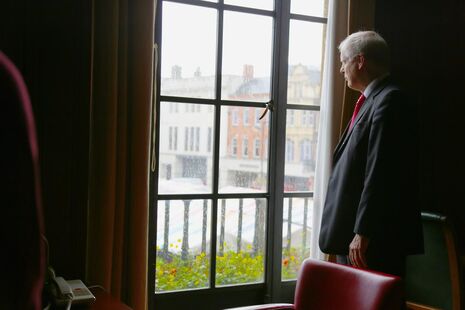
Often not thought of as more than background noise in the administrative confusion of managing a modern city, Cambridge City Council can appear irrelevant to university students. Before I asked Lewis Herbert, Labour Leader of the City Council, to show me around, I hadn’t thought much about its real importance. Students tend to be concerned with social problems, or big issues like austerity or racism, rather than when and how the city’s bins are being collected. Perhaps in a sense that’s because we’re not independent and don’t have to worry about it. But after spending some time with Lewis, I was increasingly convinced there’s a lot for students here, and we need to work to becoming more engaged with our local politics.
The Guildhall, the home of the City Council, is a beautiful building. As we walk up the steps from the main reception, a rather glorious American war memorial presents itself. Lewis talks with great interest about the history of the building, which was completed in 1937. But Cambridge’s history is of course far older, and this site has been a centre in administering the city for hundreds of years, having had a prison and a court on its premises. Lewis reminds me that in 1207, King John wrote a charter to make Cambridge a town, where before it had been a borough. There is a real sense of civic tradition here.
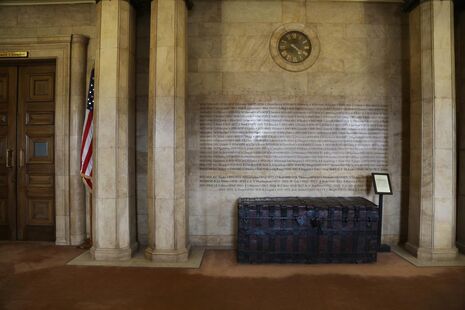
Through a wooden-framed door to the left of the memorial, we enter the Council Room. In contrast to the oppositional layout of the House of Commons, the chairs are formed in a similar circular fashion to the US Congress, as is frequent in councils across the country. I ask him whether this represents a sense of consensus here. Labour has a majority with 24 councillors, and the Liberal Democrats bolster the left-of-centre consensus with their own 14. There also two independents, one Green and one Conservative to form a body of 42.
He tells me that since May, there is an increasing sense of opposition to the new Tory government. With councils responsible for issues like housing, transport, local jobs and ensuring public areas are safe, changes in national politics are felt deeply. The bedroom tax, and the Liberal Democrats’ inclination to support it, is one particularly divisive policy, while Lewis is disappointed Labour’s manifesto policies regarding landlords won’t be fulfilled. National Tory Housing Minister Brandon Lewis, who had previously been Local Government Minister, had supported a proposal to ban local councils using the term "bedroom tax", contending it was misleading and that taxpayers’ money should not be wasted "on town hall Pravdas". There is a sense of conflict here, but it seems more between national and local government than partisan: Lewis insists that everyone works together on the Council.
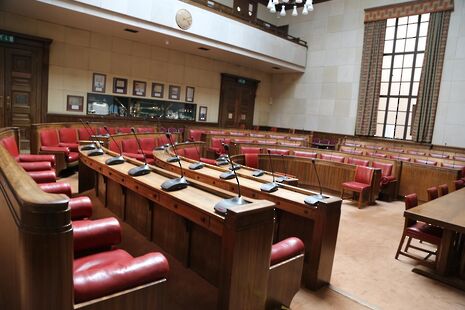
We go into some committee rooms, where he tells me the real work happens. Some members of the Housing Scrutiny Committee are sitting at a very large oval table, and show me a document. It is typical of their everyday work – scrutinising reports and long documents. A quick glance saw expansive tables and numbers, and dense detail. It is a reminder of the difficulty of managing modern, complex societies, something that can be easy to forget in the whirlwind of enthused student activism. We enter yet another room in the many corridors, and Lewis walks towards a window that seems to have a dual function as a door. He looks out onto the market, and he says this is where mayors used to step out for promulgations to the city. The civic power of the council is compared to the Senate House, and the rival power of the university. The two competing bases even had competing disciplinary systems in times past.
But the council is not static in time. It is facing cuts to expenditure and a council tax freeze, and Lewis describes his difficulty in reducing spending while protecting services. Its members are also continually re-elected. Independent Castle ward councillor Marie-Louise Holland tells me that if students had turned out to vote, she wouldn’t have been elected. She was elected in 2014 with a slim 20-vote majority over her Liberal Democrat competitor. But the turnout in the election was only 41%. She says that in elections that don’t coincide with general elections (like 2014), students are less likely to vote and representatives that permanent residents favour are more likely to get in. Yet her ward represents St John’s, Trinity and King’s colleges.
In local elections, every vote can make a difference and Lewis assures me that students can make a difference to the outcome of the city council. This year, Green candidate Oscar Gillespie won by just seven votes ahead of Labour and thirteen ahead of the Liberal Democrats in the Market Ward, home to most of the central colleges.
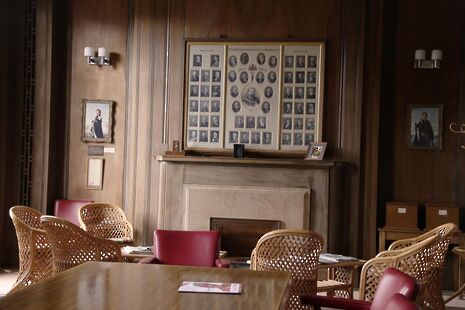
The Guildhall teems with tradition, and is full of hard-working councillors who seem genuinely passionate about their jobs. But students aren’t particularly engaged in the council, with a disinterested student body failing to come out to regularly vote. I wonder how I could join these different views of the Council together, and ask Lewis why the Council should be relevant to students.
His answer, which developed throughout our time together, was thoroughly convincing. Not only was it clear that these were closely-fought elections where students could make a real difference in their wards, but this was a large, important institution. It worked on real issues affecting students. Not least councillors’ involvement in the case of Libyan soldiers barracked in nearby Bassingbourn who sexually assaulted people in Cambridge, ensuring street lighting at night (where the County Council wants to turn significant areas of main roads off), licensing for the pubs and clubs we all enjoy, and working with the university to provide new forms of accommodation for students, and new developments such as in West Cambridge. Parker’s Piece has recently been lit up partly due to student pressure, with the Council deciding that safety at night was more important than night-time electricity bills.
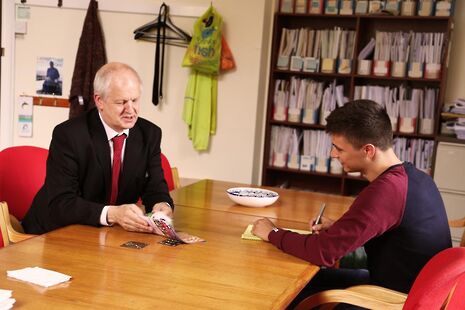
It becomes clear what the real issue here is. Cambridge students aren’t as integrated in the city as they ought to be. We need to make concerted efforts to leave the ‘bubble’ and see Cambridge for the vibrant, real and complex city it really is. As Lewis tells me, “Cambridge wouldn’t be the unique city it is without the students and the university, and cows roaming around in the middle.” He describes with enjoyment the ‘seasons’ of new students coming up, leaving for Christmas, May Week and the round of tourists coming in the summer.
But there is another side of this coin. Cambridge also has significant areas of deprivation that students here don’t travel out to see. If students were more willing to explore the city, and go to areas like Arbury, Cherry Hinton, Coleridge, Queen Edith’s or the other wards around, they would see a different side to the town. The leaders and thinkers of tomorrow shouldn’t be narrow minded in viewing the city only within the parameters of its prosperous university. How many students here know you can climb Gog Magog Hills just a cycle ride out of town? Or visit the Madingley American Cemetery just a few miles west, a monument to the American sacrifice in WWII? Or come up to Cambridge Folk Festival, one of the oldest of its type in the world, for a summer weekend?
So often this is a city we live in but don’t experience fully – we accept being an unconscious bubble in a wider social fabric. But we are also essential to the city, with its development plans based in science and technology. Cambridge University works exceptionally closely with Addenbrooke’s to provide one of the best hospitals in the country. Trinity College built Cambridge Science Park, which hosts many important businesses, including Jagex, which developed RuneScape. Cambridge graduates are essential to the ‘Silicon Fen’ phenomenon, and integrating students into the wider social fabric of the city (including engagement with local government) will enrich not only individuals, but also the city as a whole. Town and gown are interdependent, but the relationship can grow further. The materials are out there: the City Council produces a quarterly magazine called ‘Cambridge Matters’, which is available online but should be distributed to the colleges more. Lewis also reminds me that students are very welcome to liaise with the Council, and come with any suggestions or concerns they have.
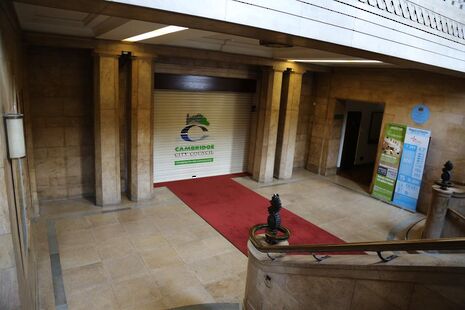
I had sharpened my thoughts on the issue more during my time with Lewis, and seeing the work the Council put in: it has significant power and deals with problems that affect students, and we have a real say on who runs it. We have our own community in part of the complex fabric that makes up our local society, but we need to learn to integrate more – the City Council is one vital way students could become more engaged.
 News / Fitz students face ‘massive invasion of privacy’ over messy rooms23 April 2024
News / Fitz students face ‘massive invasion of privacy’ over messy rooms23 April 2024 News / Cambridge University disables comments following Passover post backlash 24 April 2024
News / Cambridge University disables comments following Passover post backlash 24 April 2024 Comment / Gown vs town? Local investment plans must remember Cambridge is not just a university24 April 2024
Comment / Gown vs town? Local investment plans must remember Cambridge is not just a university24 April 2024 Comment / Does Lucy Cavendish need a billionaire bailout?22 April 2024
Comment / Does Lucy Cavendish need a billionaire bailout?22 April 2024 Interviews / Gender Agenda on building feminist solidarity in Cambridge24 April 2024
Interviews / Gender Agenda on building feminist solidarity in Cambridge24 April 2024





